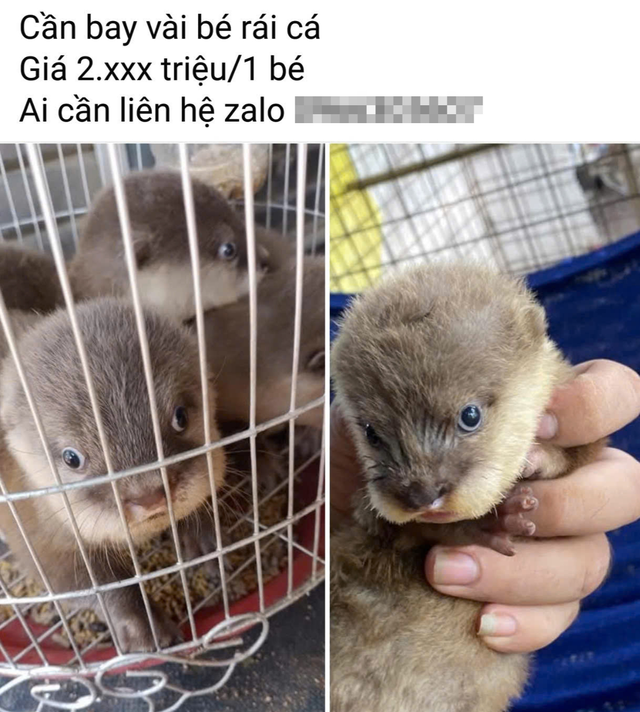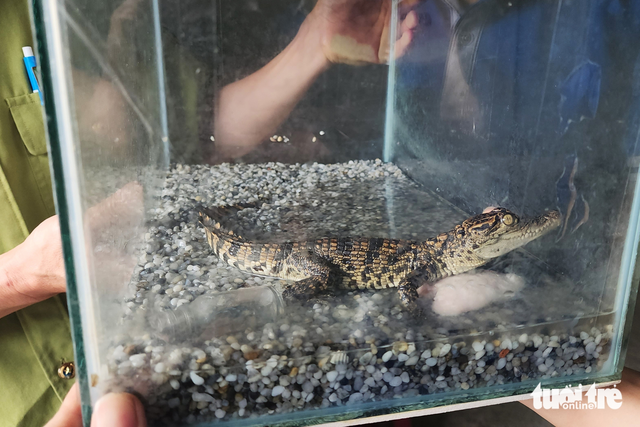
In Vietnam, illegal wildlife pet trade thrives online, on streets despite legal risks
Despite regulations requiring permits and registration to keep wildlife such as otters, monkeys, crocodiles, turtles and pythons, some people in Vietnam continue to illegally buy and raise these animals as pets, authorities say.
An investigation by Tuoi Tre (Youth) newspaper found that the illegal wildlife pet trade remains active on social media, with various species offered for sale in both public and private groups.
Prices range from a few hundred thousand to several million dong, depending on the species. (US$1 = VND25,882)
Some owners even organize offline gatherings to showcase their exotic pets.
On the streets of Ho Chi Minh City, wild animals are openly sold as pets or for religious release rituals.
A seller on Tan Ky Tan Quy Street in Tan Phu District offered turtle species such as the Mekong snail-eating turtle for VND180,000-350,000 ($7-14) each.
Another vendor in Go Vap District advertised them as 'fortune turtles,' but officials say the animals are actually red-eared sliders—an invasive species.

An online listing offering an otter for sale is seen in a screenshot from social media.
The Mekong snail-eating turtle, meanwhile, is listed as a protected species under Vietnam’s Group IIB category of endangered wildlife.
Authorities say they have received numerous voluntary handovers of wild animals in recent years, including crocodiles, monkeys, and pythons.
Some pet owners told forestry officials they were unaware of the legal requirements or later became concerned about the safety risks or ecological impact of their pets.
In other cases, wild animals such as monkeys and hornbills have been spotted roaming residential neighborhoods in the city.
Forestry officers believe these animals were either released or escaped from captivity.
Legal consequences
Under Vietnamese law, keeping or trading wild animals without documentation of legal origin is a criminal offense.
Depending on the severity, violators can face administrative penalties or criminal prosecution.
“People should not buy or raise wild animals illegally,” a forest protection official said.
“It not only violates the law but also contributes to illegal wildlife trafficking.
“These animals can pose health and safety risks, including carrying diseases or displaying aggressive behavior.”

A freshwater crocodile, weighing about 150g and approximately 30cm long, is seen inside a glass tank before being voluntarily handed over to Ho Chi Minh City’s Forest Protection Department in 2022. Photo: Ngoc Khai / Tuoi Tre
Lawyer Le Trung Phat from the Ho Chi Minh City Bar Association said that under Decree 84/2021/ND-CP, amended from Decree 06/2019/ND-CP, many species commonly kept as pets—including otters, turtles, crocodiles, and pythons—are classified as wildlife and subject to strict regulation.
Anyone keeping or trading these species must provide legal documentation and meet conditions set out by the government.
Administrative fines for illegal possession or trade can range from VND1-300 million ($40-11,590), according to Decree 07/2022/ND-CP.
Violators may also face confiscation of animals.
Failure to maintain required records of captive wildlife may result in fines between VND1 million and VND2 million.
If authorities determine that an offense meets the threshold for criminal prosecution, violators could be charged under Article 234 for violating wildlife protection laws, or under Article 244 for offenses involving rare and endangered species.
“Not every animal can be kept as a pet,” Phat said.
“People must understand the origin of the animal and comply with legal requirements to avoid violations.”
Bao Anh - Ngoc Khai / Tuoi Tre News
Link nội dung: https://news.tuoitre.vn/in-vietnam-illegal-wildlife-pet-trade-thrives-online-on-streets-despite-legal-risks-10325041715530134.htm